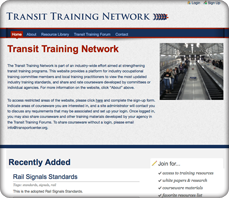News
“Not the Usual Suspects” - A Workshop for Our Time
Posted December 2017

From left to right: Madeline Janis (Jobs to Move America), Ferdinand Risco (Transit Authority of River City), Jessica Witchoski (Job Corps), Lauren Sugerman (Chicago Women in Trades), Jennifer Barrett (Southeastern Pennsylvania Transportation Authority), Doriga Alves (Transportation Diversity Council)
“Not the Usual Suspects” - A Workshop for Our Time
The transit workforce faces a crisis and the data could not be clearer. The transit workforce is much older than the US workforce as a whole, so retirements are hitting hard. Growth in transit use and local campaigns to increase transit funding mean that even more workers are needed. The data also point to another stark reality: Women and minority populations are still underrepresented in the transit workforce, particularly in skilled blue collar occupations.
So how do transit agencies go about diversifying their work places? That question was the focus of the workshop “Not the Usual Suspects” at the Transportation Learning Center’s October 26 Making Connections conference.
An experienced group of panelists from transit, labor advocacy, and transportation diversity groups addressed this challenge and facilitated lively discussion. Madeline Janis of Jobs to Move America moderated the session. Panelists were Ferdinand Risco, Assistant Executive Director at Transit Authority of River City in Louisville and vice chair of APTA’s workforce development committee; Jennifer Barrett from SEPTA’s training staff and chair of Tradeswomen of SEPTA; Jessica Witchoski from a labor-sponsored Job Corps program; Doriga Alves from the Transportation Diversity Council ; and Lauren Sugerman from Chicago Women in Trades . Workshop participants, including the Center’s Senior Associate Dr. Beverly Scott, enlivened this session with great discussion and questions to the panelists.
A few key takeaways without specific attribution:
Achieving diversity in the workplace needs to be intentional. It doesn’t just happen. Decision-makers need to set goals, use data to measure progress, reach out to new groups of workers while involving those workers who represent diversity in the current workforce in the outreach. Achieving diversity includes letting subcontractors know you mean it when you put diversity goals in their agreements.
Internships can be a tool to help disadvantaged and under-represented populations learn about your industry, your work environment, your specific agency.
Implicit bias needs to be addressed with training. It’s tough but doable. This process is challenging and worth the commitment as it ultimately makes the workplace more welcoming and inclusive to many.
Strong support for workplace diversity and inclusion needs to come from decision-makers in the transit agencies and the workers’ unions.
Registered apprenticeship can be an important tool. USDOL requires affirmative action and equal opportunity policies as part of the apprenticeship application process. Connections to the federally funded workforce system can help with recruitment of underrepresented groups.
For people who want more, here’s a link to the Tool Kit developed for the Center by Chicago Women in Trades .
